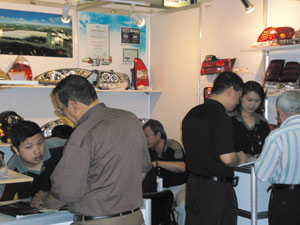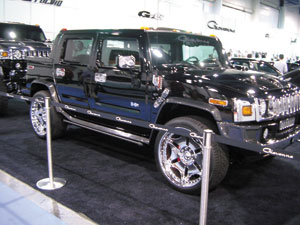Industrial Policy Updates
2009/04/10 | By Michelle HsuEarlier this year, the Beijing government announced a major auto stimulus plan to bolster China's recession-battered auto industry.
The government cut the sales tax on small 1,600cc passenger cars from 10% to 5% and set aside RMB5 billion for subsidies of up to RMB20,000 for each consumer who replaces his or her motorized tricycle or commercial van with a new one. Both policies will remain effective until the end of this year.
The government will also provide up to RMB10 billion to help automakers with technical innovation, development of new power resource, brand promotion, as well as auto mergers or acquisitions over the next three years to 2012.
The auto stimulus plan is aimed at maintaining an annual car sales growth of 12% or higher over the next three years. "The global financial crisis has seriously hit auto sales in China, and it's the time for the government to take actions to rescue the market," said an official at the central government.
In China, the automobile industry is one of the 12 sectors targeted by the government for stimulus support amidst the global market meltdown.
Argentina withdraws anti-dumping investigation for China-made bicycle frames
In an official communique published on February 17, the Argentine government announced that it had withdrawn an anti-dumping investigation on bicycle frames imported from China or Taiwan. It also set a minimum FOB price of US$3.02/kg for bicycle frames shipped from China, except for metal pivot parts. The minimum FOB price will remain effective for five years.
The Argentine government made the announcement following the ruling of the foreign trade committee that there was no sufficient evidence to support anti-dumping actions against Taiwan- or China-made bicycle frames.
However, importers are required to follow the minimum FOB price level. Those importers which procure China-made bicycle frames at a price under the minimum level will need to pay an anti-dumping tax to cover the gap. In support to the policy, the customs office requires statement of origin for such products shipped from any other countries.

The 2009 ASEAN Summit ended on March 1 with a conclusion that tariffs on imports shipped from member countries or China will be eliminated from the start of 2010, a move favorable to the auto parts trade within this region.
ASEAN will extend the zero-tariff policy to neighboring countries like Japan and South Korea by 2015, and cut tariffs on imports from Australia or New Zealand by up to 96% by 2020, making it the largest free trade bloc in the world at that time.
ASEAN was founded in 1967 by Indonesia, Malaysia, Singapore, the Philippines, and Thailand. It was later joined by five other countries of Brunei, Vietnam, Burma, Loa, and Cambodia. In addition to the 10 member countries, Timor-Leste is applying for ASEAN membership and Papua New Guinea is an observer in the group.
"ASEAN will strictly follow free trade principles to boost regional trade and fight protectionism," said Thailand's Premier Abhisit Vejjajiva, who presided over the 2009 ASEAN Summit.
Belgium to offer conditional financial guarantees to GM
In a bid to protect its domestic automobile industry, the government of Belgium told the General Motors (GM) that it would offer the financially-battered automaker financial guarantees on condition that it will not shut its plant in Antwerp, Belgium's auto production center.
GM first extended its production line into Antwerp in 1924 and opened two additional plants in 1953 and 1967. All the auto assembly lines were later combined into one under the name of General Motors Belgium in 2004, staffed with around 3,000 workers now.
The Belgian government offered the financial guarantees to GM when it was reported that the U.S. parent was likely to shutter the super-efficient GM Antwerp car assembly plant soon.
The Belgium government extended the offer twice, but has not received response from GM USA. It appears that the Obama administration is forcing GM America to close numerous non-U.S. car assembly plants even though they have already begun production of compact, super fuel-efficient models called for by President Obama.
France to lend 6 billion euros to automakers
In early February, the French government allocated six billion euros for an auto rescue fund, which will be lent to the country's two major automakers, Renault and PSA Citroen. Each automaker will receive three billion euros at a favorable interest rate.
The favorable loans, however, will be extended on a condition that the automakers promise not to lay off any workers or shut down any auto plants inside the country. The two automakers said that they would cut salaries of high-ranking executives and would distribute dividends to shareholders if the company earns a profit.
French Premier Francois Fillon told automakers that the government would set aside a budget of five to six billion euros to help automakers weather the global economic recession, in addition to the 1.3 billion euros used in 2007. The loans will be extended at interest rates between 6% and 7%.

While most major auto-making countries are considering ways to rescue their auto industries, the German government is turning a deaf ear to pleas from Opel for government loans. Interior Minister Wolfgang Schaeuble even commented that the automaker could consider bankruptcy as a better alternative to secure part of its assets.
Opel, like its parent company GM which is seeking a second round of government loans from the U.S. federal government, is seeking an US$8.87 billion (7 billion euro) financial assistance from the government. In early March, it tendered a restructuring plan to the government, proposing two alternatives solutions with an aim of saving 947 million euros annually. One is to shutter three plants and lay off 11,000 workers and the other is to lay off 3,500 workers and cut salaries across the company.
According to local news report, the German government was not pleased by the glossy 217-page brochure that Opel tried to pass off as a restructuring plan in its bid to get government loans. Local newspapers also reported that German congressmen were shocked when they found that all of Opel's assets were held by GM, and afraid that any government financial aid extended to Opel could be transferred to GM's parent. Opel was founded in 1863 and acquired by GM as a subsidiary. Finance Minister Peer Steinbrueck, however, warned that over 50,000 workers of the automaker and its parts supplies could lose their jobs if Opel goes bankrupt.
Korea considers easing ULEV requirements on U.S.-imported cars
The Korean government agreed to a U.S. request to ease its Ultra Low Emission Vehicle (ULEV) requirements and allow exemption from the new standard to up to 4,500 cars imported from the U.S. annually.
The Korean atmospheric environment act, which took effect at the beginning of 2009, restricts vehicle HC emission standards from the previous LEV (less emission vehicle) of 0.047g/km to an ULEV standard of 0.025g/km. The new standard is applicable to all locally-made or imported cars.
The U.S. requested the Korean government to ease the new standard for American cars on concern that American automakers, which are now struggling against the global economic downturn, might not be able to meet the new standards within the next few years. If implemented, the new ULEV standard would close the Korean market to most U.S. cars.
As shown in the customs statistics, Korea's annual import of American cars is slightly higher than 4,500 units-782 units from GM, 2,111 from Ford Motors, and 2,392 units from Chrysler during the first ten months of last year. Those shipped beyond the annual quota will be subject to the new ULEV standard.
Taiwan to offer subsidy to electric and diesel-powered vehicles
In Taiwan, the Ministry of Economic Affairs (MOEA) will offer up to NT$11,000 (around US$323) for the purchase of electric motorcycles, aiming to boost the annual sales of electric motorcycles past 100,000 units by 2012.
With the subsidy policy scheduled to take effect in July, the Industrial Development Bureau (IDB) under the MOEA will make a list of the electric bikers that qualify for the subsidy. The subsidy for each 3.47-5 horsepower model is NT$11,000 (around US$323), and that for a 3.47 horsepower or less is NT$8,000 (around US$236).
The MOEA is offering the subsidy to help offset the initially higher cost of electric motorcycles compared to their gas-powered counterparts.
Thailand to help GM with diesel-powered auto plant
Thai premier Abhisit Vejjajiva said in late February that the government would help General Motors (GM) obtain bank loans needed to support its new project for building a new auto plant in Thailand. The project has just been approved by the Thai government last year.
GM proposed to build a new auto plant in Thailand, focused on producing diesel-powered models, at a cost of 15 billion Thai baht. Thai government would like to help GM solve its financial problem in order to help boost the domestic auto and auto parts industries, which were among the top-five job-shedding sectors in 2008.
The U.S. to restructure automakers with government power
In reaction to the pleas of Chrysler LLC for billions in new loans in early March, President Obama's auto task force is considering to restructure GM and Chrysler, which have received US$17.4 billion in federal loans and have asked for an additional US$21.6 billion to stay in business.
In his speech to Congress in early March, President Obama said that his administration was committed to the goal of a retooled, re-imagined auto industry that can compete and win. "Millions of jobs depend on it. Scores of communities depend on it. And, I believe the nation that invented the automobile cannot walk away from it," said the U.S. president. President Obama has formed a special task force to handle the problems of the big-three automakers and, if necessary, may help them with restructuring.




